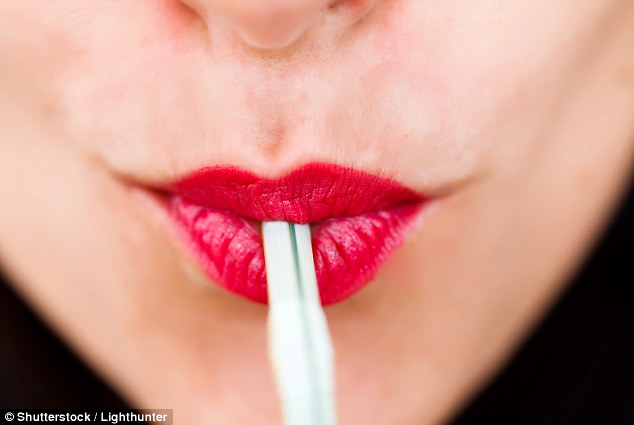Many people believe they are protecting their teeth by drinking through a straw.
Millions of Americans use them to protect their tooth enamel, prevent staining and to reduce the exposure to germs and bacteria on restaurant glasses or on-the-go coffee cups.
Indeed, studies stretching back decades have shown drinking through straws can reduce the risk of cavities and decay.
However, experts warn that it could be a myth: they say straws do very little to protect teeth from serious damage and using them may do more harm than good.
1. You may end up with ‘smokers lips’
Drinking through a straw could prematurely age the skin around the mouth.
‘When you drink from a straw you pucker your lips in repetitive motion similar to smokers and over time this increases the formation of wrinkles around the mouth,’ New York-based cosmetic dentist Dr Lana Rozenberg told Daily Mail Online.
This is because people who frequently use straws are repeatedly using the orbicularis oris muscle, which encircles the opening of the mouth. This will cause deep lines around the mouth.
Contracting these muscles ‘create a number of small parallel lines around the mouth that deepen over time as skin ages,’ said Dr Sonam Yada, medical director of Juverne, a medical practice in New Delhi.
Furthermore, a 2015 study published in Cell Research revealed smokers tend to develop wrinkles around the mouth due to the constant pursing of the lips to suck on a cigarette.
2. It might not protect teeth against staining
Many people believe using a straw will protect the teeth from stain-causing drinks like coffee and red wine, but some experts say that’s not the case.
California-based dentist Dr Mark Burhenne told Daily Mail Online that the idea that drinking through a straw will lessen the exposure of teeth to staining – one that is even supported by some dentists – is ‘absolutely not true.’
‘Next time you drink from a straw, try to notice if you feel the drink from the straw touching your teeth,’ said Dr Burhenne, creator of Ask The Dentist, a site to help people understand dental health.
‘I guarantee you will feel the drink on your teeth,’ he added.
Dr Burhenne said that even if sugary liquids and stain-causing drinks bypass the front teeth, the ones in the back are still exposed.
He said the only way to protect the teeth is by placing the straw behind the tongue and sip the drink straight down the throat. But this method is uncomfortable and impractical, adding that it would be similar to taking shots.
He added that the tongue can also contribute to teeth-staining.
‘The tongue is in constant contact with the teeth, so if soda or coffee touches your tongue, it will also get on your teeth,’ Dr Burhenne said. ‘If you’ve tasted the drink, the teeth have been exposed.’
3. Drinking through a straw can cause cavities and tooth decay
Dr Paul Sussman of the Center for Cosmetic Dentistry added that drinking through a straw does not reduce the risk of cavities.
‘The [sugary or acidic] liquid still makes contact with the teeth, so plaque can still form and lead to cavities if you don’t practice good oral hygiene,’ he said.
Previous studies have shown drinking through straws can increase the risk of cavities.
A report published in the 2005 issue of General Dentistry found straws can increase the risk of decay and cavities if people are frequently directing the liquid to a particular area in their mouth.
The concentrated direction of sugar can cause to teeth to deteriorate more quickly.
That report also revealed people are at a higher risk of their front teeth decaying if they drink through a straw positions at the front of their mouth, right behind the lips and in front of the teeth.
‘When you drink sugary and acidic drinks through the straw, make sure to position the straw behind the teeth so the contact of the liquid to teeth is minimized, otherwise you are bathing your teeth in sugar and acid which can cause decay and erosion,’ Dr Rozenberg added.
4. It can cause bloating and gas
Each sip through a straw draws air, which can lead to bloating and stomach cramps.
‘When you are drinking from a straw, you also suck up some air with the liquid which also causes bloating and gas,’ Dr Rozenberg explained.
‘One thing I counsel patients on is to avoid using a straw,’ Dr Jennifer Inra, a gastroenterologist at Brigham and Women’s Hospital in Boston, told Prevention.
‘It causes you to swallow extra air. Not only are you getting the liquid you’re drinking, but you’re also getting the air that’s trapped in the upper part of the straw.’
This can cause bloating, burping, gas, and abdominal pain.












